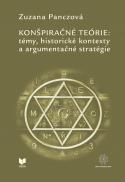Conspiracy Theories:Topics, Historical Contexts and Argumentation Strategies

- PANCZOVÁ, Zuzana: Conspiracy Theories:Topics, Historical Contexts and Argumentation Strategies. Bratislava: VEDA, 2017. 160 pp. ISBN 978-80-224-1546-0.
Today, the shaping of the public discourse is influenced not only by professional art and mainstream journalism, but also by alternative news reporting, seeking to bring topics and interpretations of events different from those reported by mainstream media. The growing influence of alternative news reporting and, hence, of conspiracy culture is clearly linked to the boom of easily available low-cost global communication tools, offered mainly by the global internet network. The research, which forms the basis of this work, has been conducted on a continuous basis since 2003. Through topics based on local events, this book observes some interesting discursive or argumentation methods that manifest the strategies of persuasion and creation of seemingly coherent models of the conspiratorial view of the world. The background is some characteristics of the concepts of ideology and discourse which help understand the ways conspiracy theories are being promoted in public debates. In the context of conspiracy theories, there are new opportunities for folklorist research to observe the current and urgent manifestations of the narrativisation of collectively shared feelings of threat or frustrations. Even though these stories do not usually have a significant aesthetic function like the “traditional genres” preferred in the past, which is due to the prevalence of information and arguments in these narrations, they provide important epic tools for expressing the urgent problems of daily life.
Keywords:
history, conspiracies, conspiracy theory